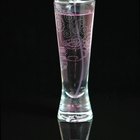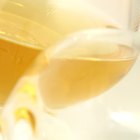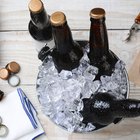a_namenko/iStock/GettyImages
Labels matter in the bourbon industry. Federal law prohibits using the name “bourbon” to label any whiskey not made in the United States under specific production standards. The process -- from mash production through fermentation, distillation and aging -- plays a role in alcohol content. Federal law also prescribes the formula required to determine proof. The proof number on a bourbon label indicates the percentage of alcohol to volume of bourbon after bottling.
Alcohol by Volume
Proof standards in the United States use alcohol by volume, or ABV, to designate the proof of beer, wine and liquor. American standards define proof as double the percentage of alcohol in the solution when it reaches 60 degrees Fahrenheit. U.S. standards require that bourbon is distilled to not higher than 80 percent ABV, which is 160 proof. Standards also require producers to bottle bourbon at 80 proof or higher.
80 vs. 100 Proof
Distilleries bottle matured, water-diluted bourbon at a minimum of 80 proof. Using the ABV standard, 80 proof bourbon contains 40 percent alcohol by volume, while 100 proof bourbon contains 50 percent alcohol by volume; 80 proof bourbon is the type mostly commonly sold in the United states. “Straight” bourbon is 100 proof and is aged for at least six years. Buying 100 proof bourbon and adding water allows bourbon enthusiasts to fine-tune the alcohol content to their own liking.
Related Articles

Difference Between Percent Alcohol & ...

Alcohol Content: Proof vs. Percentage ...

What Is the Highest Proof Tequila?
Calories in Charles Shaw Wine

Chocolate Martini: How Many Calories?

What Is the Highest Proof Vodka?

How Much Is a Single Serving Size of a ...

Alcohol in Fermented Miso Paste

The Difference Between Fruit Juice & ...

How to Make a White Russian Without ...

How to Make Alcohol at Home

What Do the Numbers Mean on Perfume ...

What Alcohol Can I Drink on a Gluten ...

Brandy Flavoring Substitute

How to Make Homemade Liquid Rouge

How to Store Cognac

How to Calculate the ABV of a Mixed ...

How to Waterproof a Canvas Jacket

Does Brandy Freeze?

What Happens to the Alcohol ...
References
Writer Bio
Gail Sessoms, a grant writer and nonprofit consultant, writes about nonprofit, small business and personal finance issues. She volunteers as a court-appointed child advocate, has a background in social services and writes about issues important to families. Sessoms holds a Bachelor of Arts degree in liberal studies.